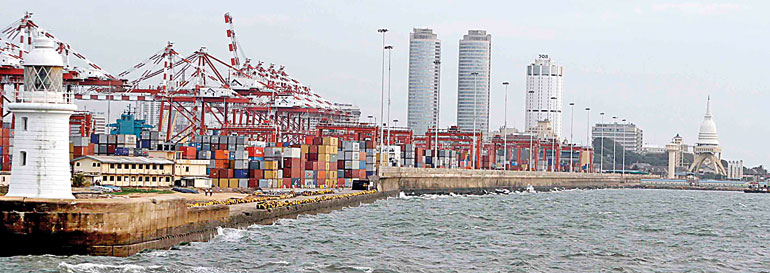Wednesday Feb 18, 2026
Wednesday Feb 18, 2026
Wednesday, 28 December 2016 00:55 - - {{hitsCtrl.values.hits}}
- Analysts allege multiple conditions placed after bids closed is aimed at eliminating top operators and to award contract to favoured party
- Bidders yet to be informed about the fate of their submissions as speculation surges

The contract to build the East Container Terminal (ECT) is facing rough weather, forcing analysts to allege authorities have placed additional conditions after bids had closed, apparently to steer the project to a favoured party, eliminating top operators.
Though bids closed for the latest deep water terminal in Colombo port on 20 September, the delay in the project being finalised and the imposition of new preconditions has fuelled speculation that another “bond-type” scam is in the offing.
The latest furore is over the Cabinet Committee on Economic Management (CCEM) recently issuing fresh instructions that operators who are already engaged in the Colombo port should not be given priority and the main companies in the region likely to compete with Colombo port should be avoided and Government entities should be debarred from competing. The earlier requirement that other parties in the consortium should have port management experience has been dropped as well.
Shipping experts pointed out that in the national interest the Government needs to focus on two variables - one is a maximum volume guarantee and the other is a royalty fee. That way the best deal can be obtained irrespective of whether bidding consortia include partners with terminals in competing ports and have existing interests in Colombo.
“Whether it is an international, regional or a domestic port operator, bids are won on the highest guaranteed annual volume and highest guaranteed revenue per container offered to the Sri Lanka Ports Authority or Government. By manipulating the tender conditions to suit a particular party there won’t be a competitive bidding process resulting in the Government losing billions of rupees,” they alleged.
Global giants such as DP World, PSA, APM Terminals and China Merchant Ports and regional port operators such as West Ports, Terminal Link and Terminal Investments are bidding for the East Terminal along with local blue chips and international shipping lines.
“The addition of new conditions for selection by the CCEM after closing the bids is illogical, illegal and grossly violates tender procedure. This has a serious impact on investor confidence,” analysts charged.
They claimed that new conditions after the issuance of the original tender document and the closure of bids favour a predetermined party. “Where is good governance and transparency when tender procedure and procurement guidelines are being violated?” industry analysts questioned. Official sources however justified the imposition of new conditions as it has been the practice.
It is ironic that East Terminal bidding process involves the Asian Development Bank as the transactional advisor. Analysts questioned the competence of ADB and the quality of its advice when multiple conditions are introduced after bidding has closed and covert efforts of alleged favoritism.
Despite widespread speculation on the future of the seven bids received, no party has been informed of the fate of their submissions but various new conditions are being slapped. Ideally the tender could be cancelled and fresh bids could be called for.
The latest conditions came on top of the inclusion of new terms in November by the CCE that Government entities, regional operators and operators who are already engaged in the Colombo port are not eligible for participation in the tender. It also created a condition that the main company of any consortium should have experience in terminal operations and the other partners should have port management experience.
Early in December Ports and Shipping Minister Arjuna Ranatunga submitted a note to the Cabinet highlighting that the new selection criteria could not be introduced after closing bids and it could also draw litigation from the affected bidders. The Minister has also pointed out that the additional selection criteria would create negative consequences in the whole bidding process of the East Container Terminal.
Sources said under the Government procurement rules and guidelines when a Cabinet appointed a Negotiating Committee (CANC) they are expected to report only to the Cabinet with their recommendations. The involvement of the CCEM is a violation of the tender process, they alleged.
When clarification was sought from the CANC prior to the closing of bids as to whether the regional operator or terminal operator already operating in the port of Colombo could bid, the response was in the affirmative. In that context the shipping industry is intrigued as to the basis the CCEM rejected this condition already accepted by the CANC.
In June this year the Sri Lanka Ports Authority and the Government, after having decided that the development of the East Container Terminal would be carried out on a Build, Operate and Transfer basis (BOT), issued a public advertisement inviting interested parties or consortia to submit their bids for prequalification on or before 21 July 2016. The detailed terms and conditions required to be met by the bidders for prequalification were stipulated in the documents issued.
An addendum to the tender documents was issued on 29 July 2016 extending the closing date until 31 August 2016 and also introducing a new condition that “weightage will be given to a consortium which includes a strategic partner from the region, having no less than a 20% of shareholding in the consortium.”
Subsequently, on 29 August 2016, it was informed that the closing date was further extended until 20 September 2016. The bids were closed on 20 September 2016 and a total of seven bids were received from five consortia and two single entities. It was expected that the Sri Lanka Ports Authority and the Government, adhering to the tender procedures, would have evaluated the seven bids received and selected the most responsive bidders to prequalify.